“When they love you, and they will
Tell ‘em all they’ll love in my shadow.
And if they try to slow you down
Tell ‘em all to go to hell.”
– Japandroids
Kanbaru knew who she was, once. She was a runner. A basketball star. A girl in love. She was somebody, at least – a specific person. There were things typical of her; she knew where she stood and where she was running to. But at the beginning of Hanamonogatari, her path has shifted from a fixed track to an open field – her past offers no clues, her future holds no direction. She’s not a basketball star anymore. Her schoolgirl crush has shifted to respect for an absent friend. All that’s left now are hard choices, and a heavy rain of insistent, contradictory advice.
Kanbaru receives a great deal of advice in Hanamonogatari. Advice from her absent mother, who tells her she must be either medicine or poison, nothing in between. Advice from the mysterious Ougi, who tells her not to worry about mistakes. Advice from her rival, Numachi – “if you run away from your worries, eventually they’ll cease to be worries.” Advice from her strange semi-uncle Kaiki, who tells her to eat meat and engage with her problems. And advice from her role model Araragi, who tells her to do what she wants to do.
Very little of this advice makes her choices any easier, and for good reason – making choices is frightening. Choice implies the denial of whole realities, and the total embracing of others. Choice can even dictate who you are as a human being. Every choice you make inspires regrets, every choice you make prompts its own future anxieties. To Kanbaru’s initial worry of the past just being a collection of mistakes, Numachi adds the equally disconcerting “all worries are just anxieties about the future.” So if the future is anxiety and the past is mistakes, what can possibly guide our actions?
Kanbaru exists on the knife edge of young adulthood, stranded between a past that seems like it belongs to someone else and a future with no signposts or visible goals. Compounding her indecision is her mother’s voice, absent in daylight but ever-present in her dreams, telling her she must make choices, must act, must not think too much and let herself become a muddled, indecisive “might have been.” “If you’ve got the time to think, you’ve got the time to act,” she says. But how? And in what direction?
The story opens with Kanbaru glumly monologuing on how life is so much less interesting with Araragi and Senjougahara “gone.” Considering this is Monogatari, the immediate implication is stark – but though Kanbaru corrects herself and clarifies that they’ve merely graduated, in the context of her life, it doesn’t really make a difference. They’ve moved on, moved past her moment and identity – while they’re off experiencing life together, she remains passive, trapped in high school with a cursed arm and a shuttered basketball career. Her own choices have led her here, but “here” feels an awful lot like nowhere. And her old rival Numachi taking back her devil’s arm does little to quell her anxieties.
Numachi is the fulcrum Hanamonogatari turns on, the one who plays the part of Kanbaru’s devilish shadow. Whereas Kanbaru’s career only recently ended, Numachi has been a ghost since middle school – a crippling leg injury ended her athletic aspirations, and in light of that, she’s decided to “make that her tombstone.” She collects sins and idolizes the thought of running from your problems – she’s taken action-fearing stasis and turned it into a full identity. Numachi is essentially a living representation of all the young adult fears Kanbaru herself is struggling with – even her collection of the various devil’s limbs rings of the awkward transitions of late adolescence, as changes in your body are echoed by changes in your very identity. And it’s hard to make choices about your future when you don’t even really know who you are.
Identity is a constant question in Hanamonogatari. Numachi defined herself by her athletic abilities – when they died, her self-image died with them. And yet even now, she still wanders around in her track suit, still seems ready for a pick-up game – even as she curses her misfortune and urges Kanbaru to “live a full life,” she still lives in hope of reclaiming her past self. Kanbaru is the same way – her “I have a tendency to be torn between options” is a revelation she only comes to because she’s been denied her old identity, the security of excelling in basketball and bantering with Araragi. Both of these characters have just reached the point in their lives when they realize they can’t be the same person forever, and the transition out of that requires accepting your self-definition can change without you losing sight of your true self. The specter of the working world hangs over them – Kanbaru frets over finally committing to her studies, Numachi scowls about her poor job prospects. The end of your first identity is a time of uncertainty, of fear.
This fear comes to a head in the arc’s moment of greatest honesty, when Kanbaru collapses at an actual, non-metaphorical crossroads and is picked up by Araragi. When asked if something’s wrong, she lays everything on the table. “I’ve lost control. Nothing is really working out the way that I planned. I don’t even know what’s typical of ‘me’ anymore.” Araragi’s advice is typical of Araragi – “forget the demands of others. Do what you want to do.” It’s not particularly profound, but it’s the push she needs – though she’s almost overwhelmed by the volume of voices telling her the “best choice,” one nudge from Araragi, as well as a sharper push from Kaiki, remind her that there’s at least one thing she truly wants to do.
Ultimately, it’s revealed that Numachi really is a ghost – that her life truly ended when her first identity did, and since then she’s been an apparition herself. She could even be Kanbaru’s apparition – they mirror each other enough, fill in the holes in each other’s philosophy, and might even have been lovers, if life weren’t quite so complicated. But you can’t live in what might have been. Even if, as Kanbaru admits, the pain of failure, of something you attempted and failed, is much greater than the pain of inaction, only action can bring release. “Don’t you want to ascend?” she asks her rival/lover/devil/friend. All of us want to move forward. The path is never clear, and everyone makes mistakes, but you have to keep running. As Kanbaru lies prone at the crossroads, she allows herself a brief moment of reflection. “My legs hurt. I should have paid attention to my form, at least. But if I had, I’d never have made it this far.”
In the end, Kanbaru frees Numachi. She beats her by establishing a brief, sharp connection, allowing Numachi to feel for a moment that she isn’t alone. But “loneliness” is always a question of perspective – to any outsider watching this story, it’s clear that Kanbaru and Numachi were never alone, because they mean too much to each other. This truth of our common influences is made even more explicit in the last scene, as Araragi and Kanbaru each admit they don’t see themselves as strong – they see the other as strong, and try to act how they think their role models would. Identity isn’t something you can claim and forever hold – as long as you’re moving forward, you’ll be continually reinventing yourself, and it’s hard to trust in a strength you can never fully understand. But it’s always hard to see yourself without a mirror’s aid, and we have mirrors all around us – those we influence, those who inspire us. It is up to those we believe in to show us who we want to be, up to those we love to assure us of who we are.
The characters of Hanamonogatari constantly struggle to assign meaning to the circumstances of their lives. “This arm is the symbol of the sins I bear.” “This is my punishment for choosing basketball for such arbitrary reasons.” They seek a coherency in life – if their prior actions add up to a comprehensible road, then perhaps their future might make sense as well. But life is not that simple – much of the time, things simply happen. And by the end of Hanamonogatari, Kanbaru is beginning to realize that. I love the simplicity of her takeaway from her encounters with Numachi – she doesn’t see it as any broad proclamation on the nature of living or constancy of regret, but instead simply acknowledges that it’s nice to run into old friends. You can’t live in anxieties and you can’t live in regrets – all any of us can hope to do is simply live.
“It’s a lifeless life with no
Fixed address to give
But you’re not mine to die for anymore
So I must live.”

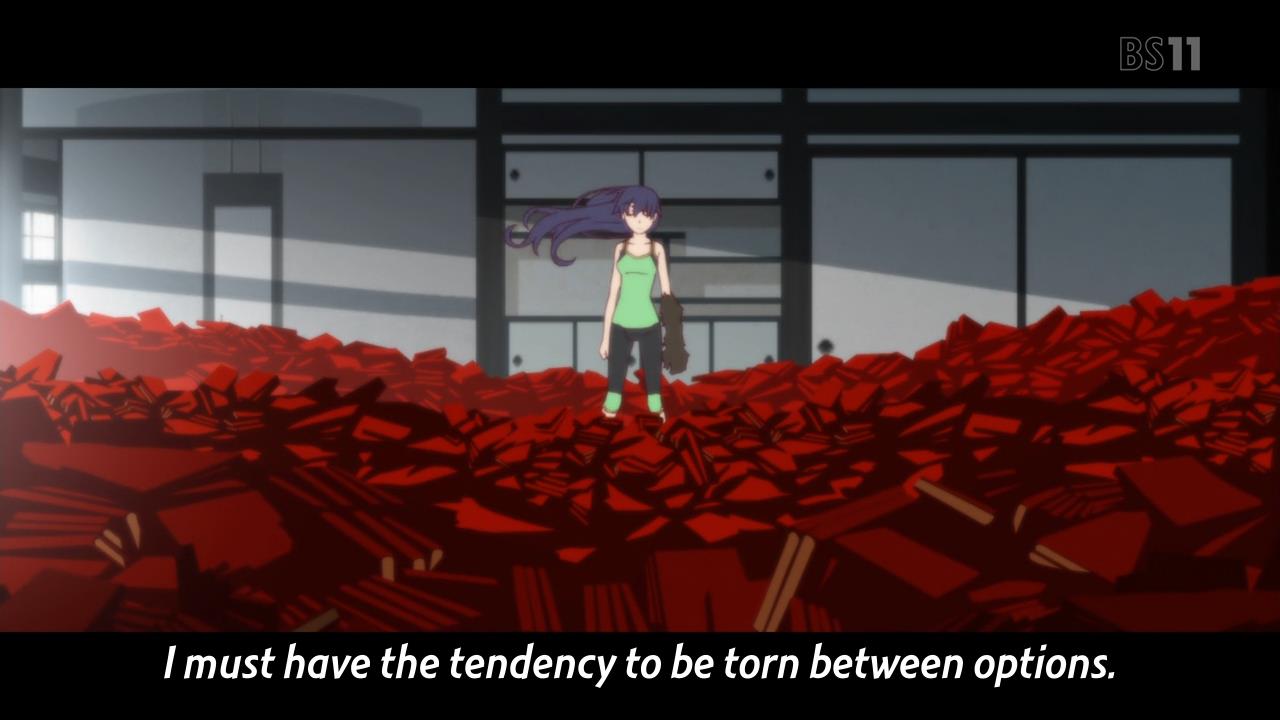
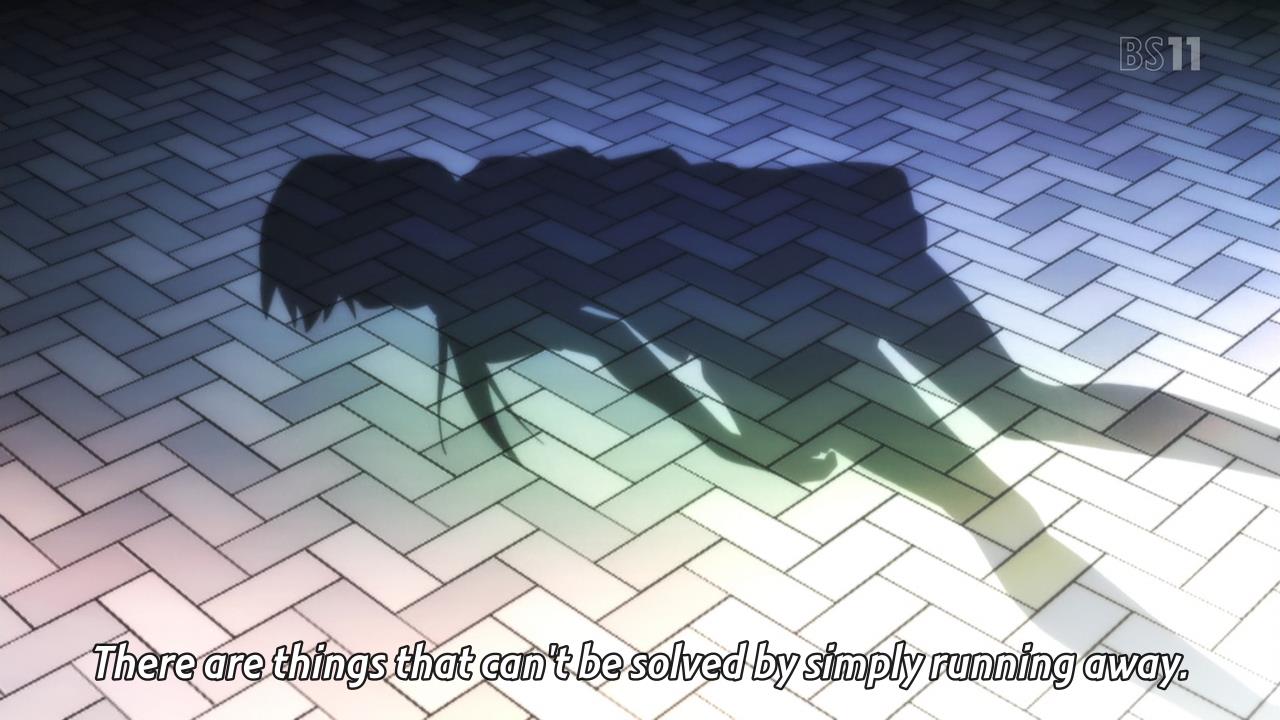
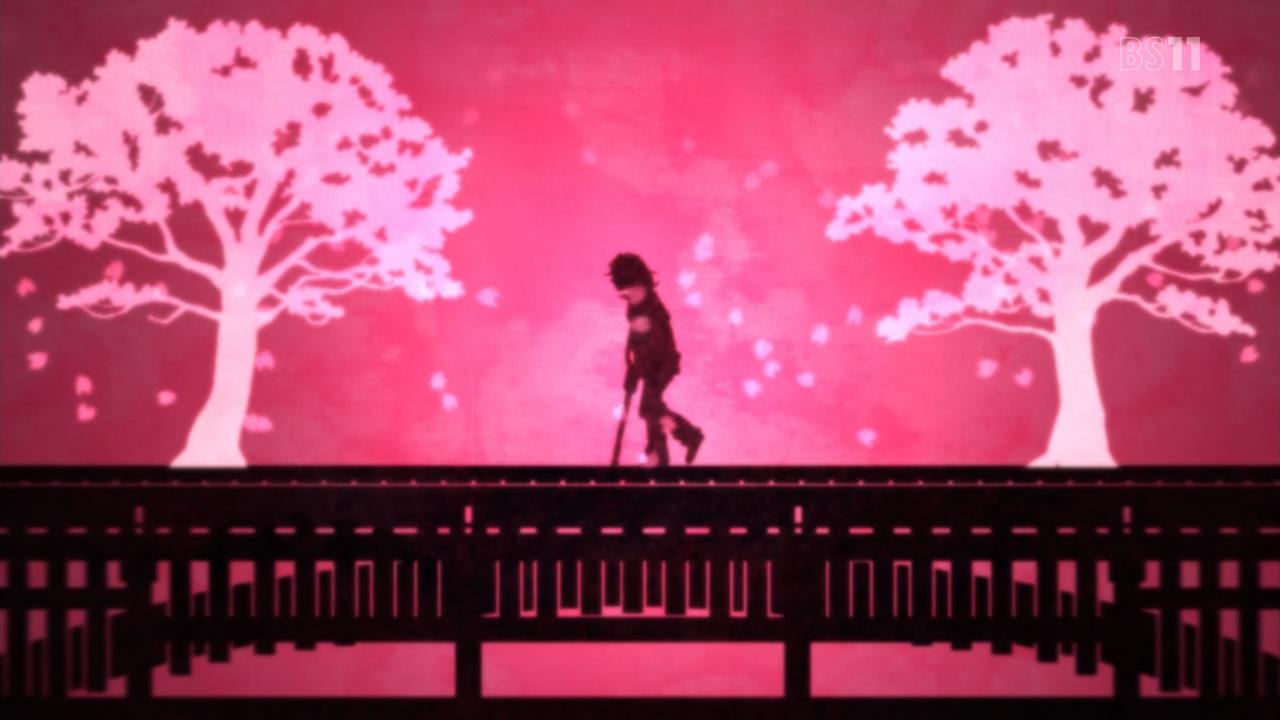
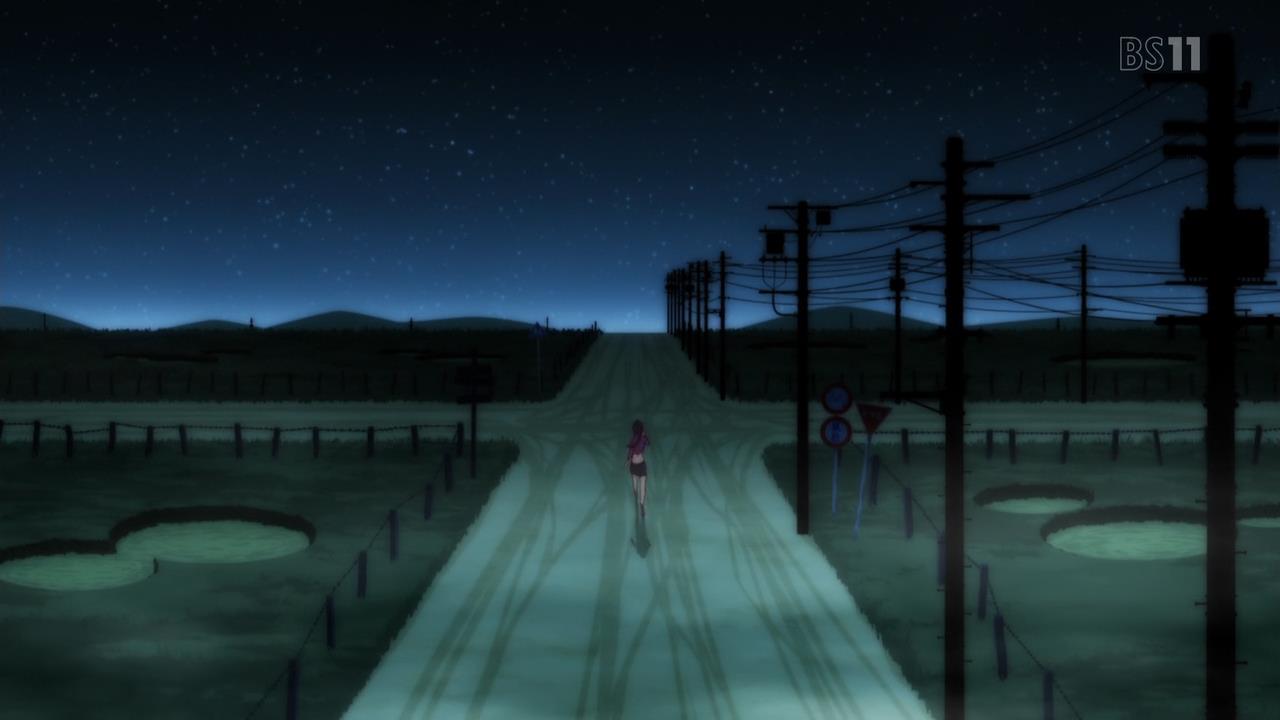
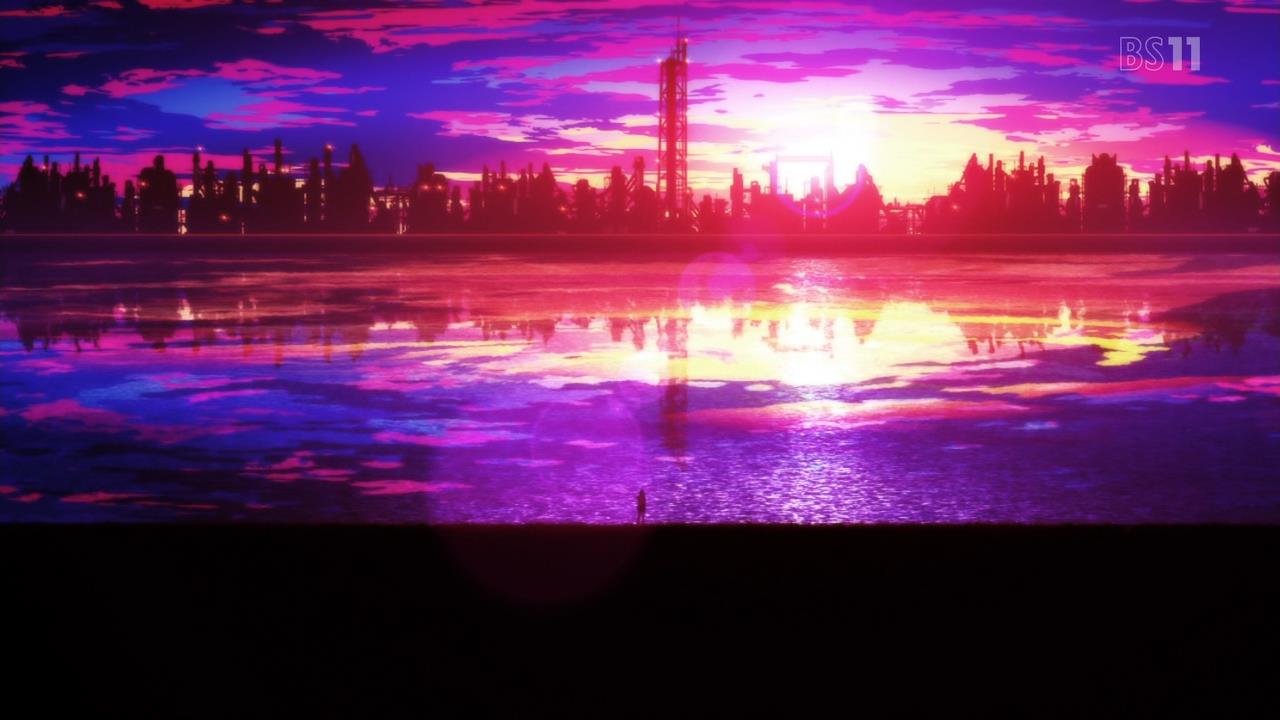
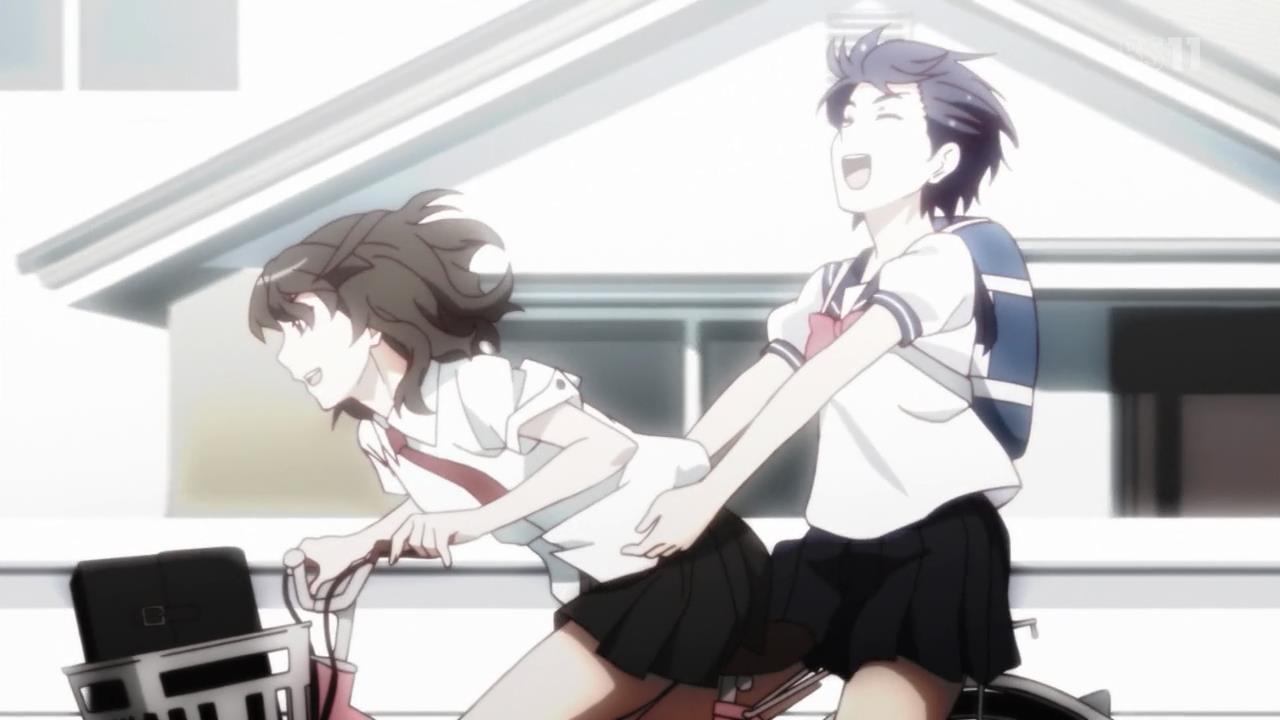
As always, a really nice essay.
This idea of stasis as a result of falling into the gap between identities and states of life (I particularly liked the way she describe herself: “Squishy and indecisive)…it’s certainly a struggle we’ve seen before in this show and, I suspect, one many of us have experienced in our own lives. It’s pretty interesting that, at then end of the story, Kanbaru goes back to her first hairstyle—but it’s not that she’s reverted to her old self, but started to incorporate that previous version of her identity into her current, evolving self.
As a final note, I actually preferred Crunchyroll’s translation about thinking and action: “If you have time to think, act.” I like the simplicity of the line compared to the longer translation you quote here (I assume from Commie?). Either way, it’s a thought-provoking line.
I could definitely relate to the fear of both stasis and choice in this arc. “Choice denies whole potential selves” is something I think about a lot at this point in my life.
And yeah, that was the Commie translation. I’ve stuck with them through all of Monogatari, I think.
It’s definitely a vicious cycle. Fear of choice leads to stasis, fear of stasis leads to a feeling of necessary choice, and the guilt and terror becomes paralyzing. At this point, we’re not even so much talking about Kanbaru specifically as just how things are. It’s interesting, though, because the continual reinvention of self you mention is the best way to cope with those fears. We can’t possibly ever assuage every fear, but we can adapt to the realities our choices bring. It might feel like a losing battle, but unless you take a step from the place you stand, you’ll never know if you’ve chosen the right direction or not.
I’m not sure if I totally agree with the idea that “choice denies whole potential selves,” at least not in a totally permanent fashion. Sure, there are some things you can’t go back on, but this is where that reinvention of self comes in. Made a mistake? Change. The obvious qualifier is that this isn’t as easy as it sounds, but I think there’s a core self that has to exist for the person to be held together. As the anime cliche goes: “You are you.” People don’t change all at once, but little by little; when one part of you changes, others stay the same. It’s when people reduce themselves to a single aspect of themselves (for example, Numachi and her athletic career) that they can fall easily in to despair. I think Kanbaru has always known that there’s more to her than just her relationships with Araragi and Senjougahara or basketball. But, of course, it’s never easy to see beyond the things that are changing to the things that have stayed the same (like old friends, one could say).
Very nice piece! Also, if you don’t know, it seems that there was some wordplay involved in the meat scene with Kaiki.
In Japanese, meat is “niku” which Kaiki of course says throughout the scene. This is contrasted against Kanbaru talking about hate, which is nikumu in Japanese. I suppose that the intent was that whenever Kanbaru throws her hate, or nikumu, at Kaiki, ge responds with meat, or niku, which ends up representing his care for her.
Apparently there’s a lot more wordplay like this throughout Monogatari too, but most of it has been lost in translation.
Really nice cultural-linguistic pick-up there. It’d be lovely if translators put extra effort in detailing some of the wordplay otherwise lost from Japanese to English, but that might be asking for too much for a timely release upon stream.
Interresting.
I really liked when Kaiki told Kanbaru she didn’t have to hate him just because Araragi and Sengohara does.
Nope, didn’t know that. Interesting stuff. And unrelated, but I really, really loved seeing Kaiki acting like the awkward but well-meaning uncle here. I feel like every scene with him just makes him more likable.
Kanbaru is indeed throwing her hate at Kaiki in this scene, which makes the wordplay work, but Kaiki’s “niku niku niku” response refers not just to this, but also to her spiteful nature in general. In fact, it’s more like he’s mimicking her, as she screams the same thing at Araragi during their fight in Bake.
I’ve been waiting for this, the inevitable Hanamonogatari essay, since the series was released. As always, you’ve delivered and impressed. Well done! This was as enjoyable a read as I was hoping it would be. Your Monogatari essays always give me a sense of closure that I can’t get just from watching the series. Keep up the good work!
They give me closure too! I’m glad you enjoy them.
Pingback: Hair and Hana | Hanamonogatari, A Review | therefore it is
I was waiting for this one.
Good piece, once again.
I recognized that Hanamonogatari had a really strong message, but Numachi’s endless monologuing irritated me to no end. Especially her long speech about her soccer backstory. Would it have killed Shaft just a tiny bit to break from regurgitating the novel and give it to us in flashback form? Or at least dramatize the monologue with visuals of what she’s actually talking about? You know, like how they did Kanbaru’s track backstory in Suruga Monkey?
I know, I know, it might be symbolic, that Numachi doesn’t even think of her soccer team as people so much as nebulous figures that hate her, and that the first time she actually connected with anyone was the girl that first asked for her help, as signified by that being the first instance of a human figure visualized in her memories, but ugh, Numachi just droning on and on set to mostly still visuals and pans (no matter how pretty they were) was really grating on my “show, don’t tell” nerves.
Others have said Kanbaru is a bland character in comparison to Numachi, but given the context of the previous Monogatari installments, I thought that the cinematography that would represent her perspective was fascinating in illustrating her character. For all of her sexual banter with Araragi, we don’t see much of that in Hana. There’s body awareness, of course, but not under a sexual lens so much as an athlete’s evaluation, and she is never sexual towards her classmates or Numachi. It seem that that side of her is tied to her interaction dynamics with Senjougahara and Araragi, and is primarily a public persona only. And even during the one humorous conversation that feels extremely out of place and regressive in Hanamonogatari, she reacts as Araragi’s straight man, rather than provoking him or escalating things, at a time when she’s feeling more self-reflective and genuinely seeking guidance.
Would watch Alternate-Universe Numachi/Kanbaru romance show where is the fanfic
Yeah, finally seeing Kanbaru’s perspective was interesting. It actually seems like she’s by far the most well-adjusted and “normal” of the Monogatari characters, which is reflected in this arc being largely about anxieties virtually any teenager has to grapple with.
And completely agreed on alternate-universe romance show. That credit sequence felt like a punch in the gut – it made the entire arc feel like the aftermath of a great story we were only barely aware of. They’re a very cute couple.
You mean, they could’ve been.
Same as the 80’s Shoujo starring Senjougahara and Kaiki.
Well shoot. I shouldn’t have read this before watching, apparently. Thing is, I’ve started watching just this year (seriously watching anime, anyway), so I’ve missed a lot. But then again, I tend to decide what I watch based on what the series “spiel” is on whatever website is streaming it (Crunchyroll mostly, The Anime Network/Funi on occasion.) -Monogatari didn’t appeal to me based on that. DK why.
But you’re saying here (and in your top 30) that it’s apparently pretty amazing. I’m on the outside looking in, and I do my best to watch anime that are GOOD. (My MAL: http://myanimelist.net/profile/teezoen) You think I’d like it…?
My personal guess is probably, yes. Some things might put you off like the constantly perverted camera gaze for example (at least until Monogatari Second Season) but if that’s the main thing are paying attention to, you are missing the point (and most of the super fast paced, albeit generally unimportant, dialog). Still, I know some people were discouraged by it so just a warning.
OK, thanks. I might give it a try, but I have a huge backlog right now, including FMA:B, Mushishi, Haibane Renmei, etc… What’s the “correct order” to see them in? Release order?
Kinda depends! It’s a very unique and ever-changing show, one you probably just have to watch and see if you enjoy. As for your question below, yeah, release order. Bake (15 episodes) -> Nise -> Neko Black -> S2 -> Hana
Holy confusion Batman! O_o So Neko Black is “Kuro”? OK. I might give it a try.
Looking forward to your ANN previews/reviews of upcoming simulcasts. 🙂
Why do i watch things like SAO and AldNoah (and Precure) and end up with no time for Utena or Monogatari, there is something wrong going on…
Anyway, i look forward to watching Hanamonogatari. Your first paragraph already made me fall in love.
Bobduh, have you watched MedakaBox? (even better, – have you read the manga?). Because MedakaBox was made by the same guy (Nisio Isin) who made Monogatari. MB is a different approach to the same thing Monogatari is doing – at least i believe so (inner monsters etc). Id love to see you write some bits about Kummagawa and Minus arc.
Nah, haven’t gotten to Medaka Box. I do plan on reading the manga at some point.
This is quite the incredible analysis, I’m jealous of your ability to break things down. Monogatari lends itself to so much analyzing that there’s few things more enjoyable than seeing someone just sit down and do it. Thank you for the essay.
I was wondering what angle you’d attack Hana from. I guess I shouldn’t be surprised you went back to Monogatari’s old Identity and Adolescence elements. There was definitely a lot in there, though! I really liked the “lonely view from the top” aspect of Numachi’s character. I kinda wish they’d done a little more with it. Her innate talent and competitive nature drove her to excel in basketball, but also isolated her from her teammates. When she couldn’t play anymore, she was left with neither and just continued to fixate on it. It’s an interesting commentary on the self-destructive aspects of passion and obsession. And those things sure are still relevant in geek media right now!
The moment of honesty you wrote about from Kanbaru where she admits that nothing is working out the way she planned reminded me of something from the end of Shinobu Time, when Araragi is talking to Ougi after Hachikuji’s issue has been resolved.
Araragi has just gone through with his plan to tell only Ougi the truth about what happened to Hachikuji and then see what happens. It flashes by quick, but the text cards say “Nothing I think about helps me. I give up where I should try to fight and I’ve even stopped being sad about it, I think.” That struck me when I first saw it as Araragi reaching a crossroads after the loss of Hachikuji, where he feels like his previous life is changing beyond his control and he doesn’t know how to act. But it struck me more hearing what I felt was a similar sentiment from Kanbaru, seeking advice from Araragi who had so recently gone through the same thing.
An absolutely amazing analysis. Thank you for taking the time to make these.
Reblogged this on Japesland and commented:
A wonderfully-written analysis of Hanamonogatari, one of the weaker, but still interesting, entries in the Monogatari series.
The crossroad scene made me remember this
Also, great use of Japandroids, I love them, and live they are something else.
Apart from that, great analysis as always, keep the good work.